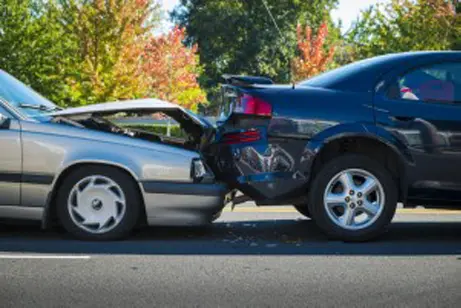
In the insurance industry, we often find ourselves wishing that we could just see what exactly went down when the loss occurred from an auto accident.
Sometimes people are lucky enough to find someone had a dashboard camera recording the whole incident, but those instances are few and far between. To be more realistic, it may be better to take a look at the businesses or homes surrounding the scene of the loss or see if any department of transportation cameras monitor the area.
The process of obtaining these videos that may have captured an auto accident can be a bit tricky and time-consuming, which is why private investigators are often hired in these instances. When it comes to locating businesses or home in the area of the loss that may have videos, the first step would be to see who has cameras on the outside of their buildings. As in the image above, the view and angle of the camera is key. Many small businesses will have cameras angled just in front of their front doors, but others may have them angled at their parking lots which may give view to the streets nearby. Private residences may have outward facing cameras in the forms of doorbell cameras or security systems. Canvassing these businesses or homes, and speaking with the managers or owners to see if they will share the footage they have from that date is the best route to obtaining these videos. Some businesses may require a formal request from an insurance company, just to track the interaction with their corporate offices. To obtain videos from street cameras placed by the government or department of transportation, formal requests should be made through a Freedom of Information (FOIA) request. Legally, any resident can have access to these videos unless a police investigation is underway or if it may violate a person’s privacy.
Another side to this investigation is the “what if” questions.
What if the businesses don’t have video or refuse to share it? What if it’s too late and they’ve already copied over the tapes? What if our request was denied? What if you can’t verify who was in the cars? Most of the private sources for security camera footages, such as businesses or homes, will retain their video for 30-60 days depending on their equipment and storage space. Many small home security systems will begin overwriting footage after a few days. Bank ATMs may retain footage up to 90 days, as set by standards in their industry. Public access cameras on the other hand can often extend beyond all of that, and it is up the local government to determine how long they save video for. So, as you can see, if you want to get copies of auto accident footage, it’s better to act quickly.
Another aspect to consider is the quality and range of the video.
A video from a home’s doorbell can be some high quality footage but the range of the video may only be a hundred feet or so. Parking lot cameras or highway cameras may be lower quality, but you may be able to see more ground coverage. Keeping that in mind, having footage of the auto accident is better than having none at all, so you can get a clearer image of what went down at the scene. It is noteworthy that not all cameras in an area may be recording. In the state of Michigan, freeway cameras are set up only to monitor traffic and road conditions. Traffic light cameras are often used to just to capture still images of people driving through that red light. Cameras set off by sensors will often only record if something happens within a certain number of feet from the location. Keeping all of that in mind is important when requesting footage.
You may find yourself wondering why anyone would hire a private investigator in this situation?
Isn’t all of this footage public record or data that can be requested? Yes, public security camera footage can be requested and contacting businesses or homeowners for their footage is just something you can ask for. As professional investigators, we handle matters like this everyday because we know who we should be requesting footage from, and the time sensitivity involved. Going in person to request footage tends to make the process a little smoother and we can work with staff at the businesses to pinpoint what we need and what it will ultimately be used for. Adjusters and attorneys in the insurance industry hardly have the time to go out canvassing the streets to get auto accident footage from security cameras, so that is where investigators come in. We can save time and get all of the details squared away, so you can go back on the defense to prevent fraudulent claims from cheating legitimate claims for the money they need.
Sources:
Local Government and Privacy: Are Security Videos Public Records?
What’s the difference between traffic cameras, red light cameras, and speed cameras?